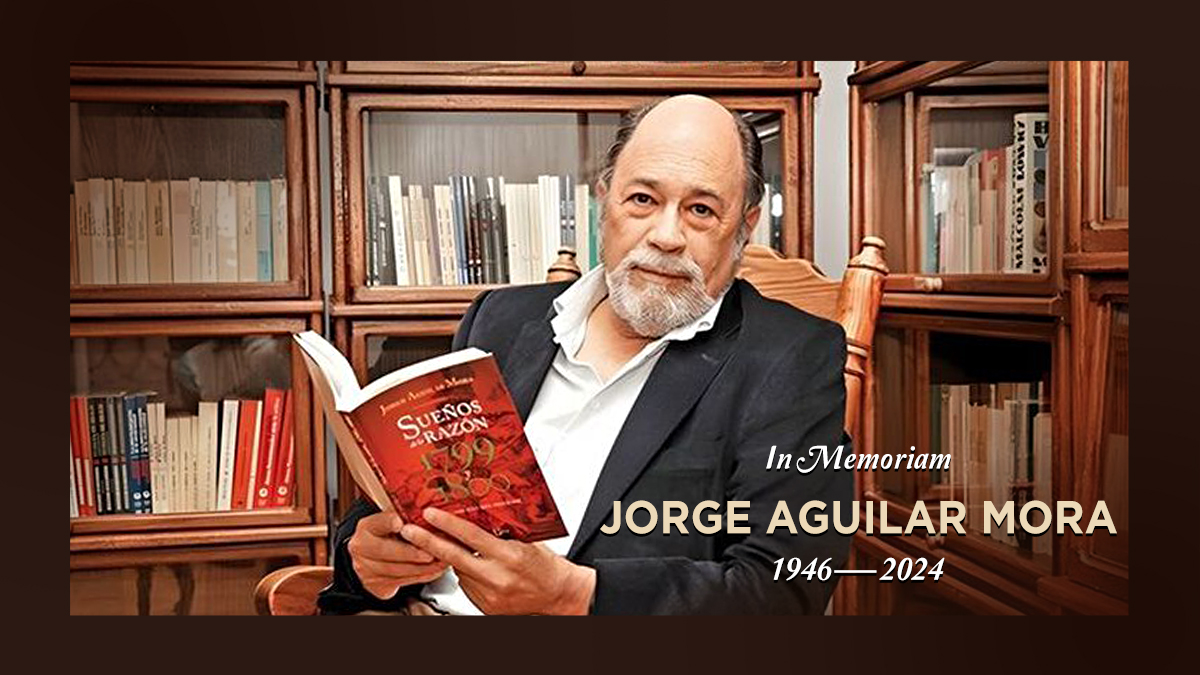Jorge Aguilar Mora, Professor Emeritus in the School of Languages, Literatures, and Cultures, Dies at 77
February 23, 2024

Aguilar Mora was a renowned Mexican essayist, literary critic, poet and novelist.
By Jessica Weiss ’05
Professor Emeritus in the School of Languages, Literatures, and Cultures (SLLC) Jorge Aguilar Mora, a renowned Mexican essayist, literary critic, poet and novelist, died on January 5, in Bethesda, Maryland, just days before his 78th birthday. He taught in the Department of Spanish and Portuguese from 1981-2001 and in SLLC from 2001 until his retirement in 2010.
The author of three novels, six books of poetry, and numerous book-length essays on the Mexican Revolution and various Latin American writers, Aguilar Mora was called “one of the most important Mexican writers” by Mexican literary critic Christopher Domínguez Michael. In 2015, he won the Xavier Villaurrutia Award, among the highest literary awards in Mexico, for his work “Sueños de la razón, 1799 y 1800,” which takes readers on a journey through the end of the 18th century and the beginning of the 19th century.
Carmen Benito-Vessels, professor of medieval studies and longtime colleague of Aguilar Mora, called him a “genuine luminary.” “He thought about every word, he treasured the Spanish language,” she said.
Former student Rebeca Moreno, Ph.D. ’13, now the assistant director of engagement and inclusion programming on UMD’s International Student and Scholar Services team, said Aguilar Mora “possessed an unparalleled knowledge and love for Latin American literature. … He was a brilliant teacher devoted to the craft of teaching and learning.”
Aguilar Mora was born in the city of Chihuahua in 1946, and grew up in Mexico City. He studied Hispanic language and literature at the National Autonomous University of Mexico. Subsequently, he pursued postgraduate studies in Paris, where he became a student of French essayist and critic Roland Barthes. He returned to Mexico to complete his doctorate at El Colegio de México.
He taught at universities in France, Mexico, Puerto Rico and Ecuador. In addition to his university activities, Aguilar Mora practiced cultural journalism, collaborating on several magazine editorial committees and publishing reviews, articles and translations.
Benito-Vessels called Aguilar Mora’s knowledge “encyclopedic.” He was present on the search committee when she interviewed for her position at UMD in 1989. Nervous to go before such a renowned author, she remembers reading as many of his works as possible.
“But much to my surprise Jorge had read my Ph.D. dissertation from beginning to end,” Benito-Vessels said. “After the first 15 minutes of the interview, I forgot that I was there looking for a faculty position.”
Professor Laura Demaría, director of graduate studies in the Department of Spanish and Portuguese and a colleague of Aguilar Mora since 2002, likewise said he possessed a “true intellectual honesty.” The two developed a close friendship thanks initially to their shared interest in 19th century literature.
“He was one of the most important intellectuals of his generation but he never showed off,” she said. “True intellectuals know that they don’t have to put people down in order to shine. He was extremely generous.”
When Demaría published her first novel in 2018, Aguilar Mora penned a blurb while undergoing medical care in Mexico that she called “one of the most beautiful things someone has said” about her work.
“I had told him not to worry about it and to focus on himself, but of course there was no way he was going to forget about it,” she said. “That’s how he was.”
At UMD, Aguilar Mora taught courses on Latin American civilization; 19th century Latin American literature (novel, poetry, essay); 20th century Latin American poetry; narratives of the Mexican Revolution; and specific authors such as César Vallejo and Octavio Paz, as well as seminars in literary theory. Named a Distinguished Scholar-Teacher at UMD in 2006, he was a devoted mentor to countless students.
Senior Lecturer of Spanish and Portuguese Chila Pertuz-Hidalgo Ph.D. ’15 first took a class with Aguilar Mora in 1996. His teaching methodology fascinated her so much that she decided to take five more classes with him during her master’s and doctoral studies, all focused on 19th century literature. “He was a very wise, brilliant man, with a mind that was an inexhaustible source of knowledge,” she said, “knowledge that he constantly wanted to share with his students without limitations or selfishness.”
Pertuz-Hidalgo credits her doctorate to Aguilar Mora, who served as her dissertation director and was a steady presence after her mother died and she considered pausing the program. “His words of encouragement penetrated so deeply, to the point that I finished and defended my dissertation.”
Moreno, too, recalled his dedication to her development and advancement as a Ph.D. candidate, even after he’d retired. “He would carefully read every page and then meet me at a local coffee shop to discuss every idea and to provide insightful suggestions to improve the project,” she said.
Upon his retirement from UMD, Aguilar Mora wrote a letter to faculty in the department in which he reflected that he had sought to make his teachings “part of the spiritual wealth of the students so they can live with [them] instead of simply using them.” He wrote (translated to English):
“For me, teaching means giving signals. … I have never been interested in expressing what I know, I have always been passionate about showing how ideas live.”

